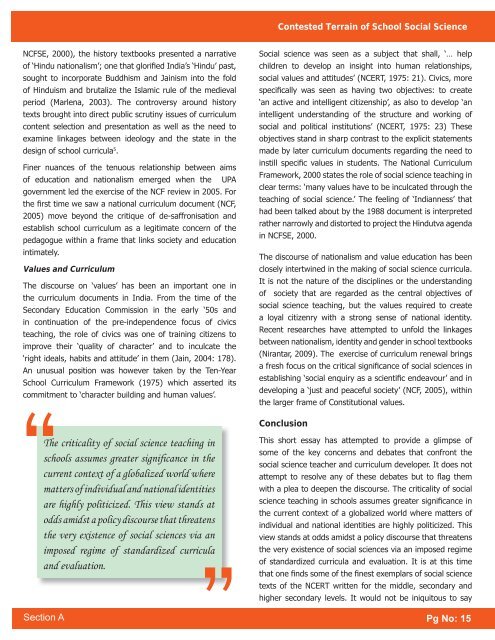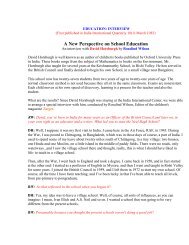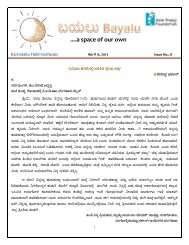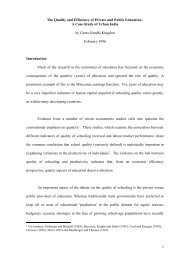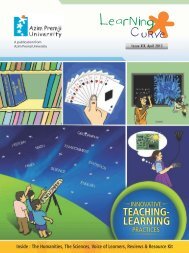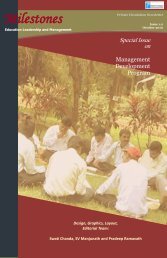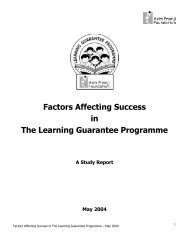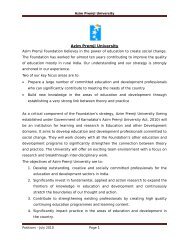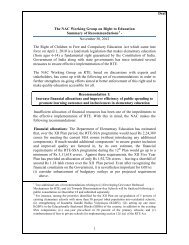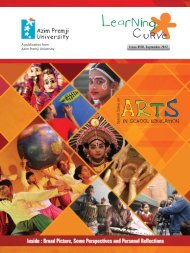Indesign Pagesnew.indd - Azim Premji Foundation
Indesign Pagesnew.indd - Azim Premji Foundation
Indesign Pagesnew.indd - Azim Premji Foundation
You also want an ePaper? Increase the reach of your titles
YUMPU automatically turns print PDFs into web optimized ePapers that Google loves.
NCFSE, 2000), the history textbooks presented a narrative<br />
of ‘Hindu nationalism’; one that glorifi ed India’s ‘Hindu’ past,<br />
sought to incorporate Buddhism and Jainism into the fold<br />
of Hinduism and brutalize the Islamic rule of the medieval<br />
period (Marlena, 2003). The controversy around history<br />
texts brought into direct public scrutiny issues of curriculum<br />
content selection and presentation as well as the need to<br />
examine linkages between ideology and the state in the<br />
design of school curricula5 .<br />
Finer nuances of the tenuous relationship between aims<br />
of education and nationalism emerged when the UPA<br />
government led the exercise of the NCF review in 2005. For<br />
the fi rst time we saw a national curriculum document (NCF,<br />
2005) move beyond the critique of de-saffronisation and<br />
establish school curriculum as a legitimate concern of the<br />
pedagogue within a frame that links society and education<br />
intimately.<br />
Values and Curriculum<br />
The discourse on ‘values’ has been an important one in<br />
the curriculum documents in India. From the time of the<br />
Secondary Education Commission in the early ‘50s and<br />
in continuation of the pre-independence focus of civics<br />
teaching, the role of civics was one of training citizens to<br />
improve their ‘quality of character’ and to inculcate the<br />
‘right ideals, habits and attitude’ in them (Jain, 2004: 178).<br />
An unusual position was however taken by the Ten-Year<br />
School Curriculum Framework (1975) which asserted its<br />
commitment to ‘character building and human values’.<br />
The criticality of social science teaching in<br />
schools assumes greater signifi cance in the<br />
current context of a globalized world where<br />
matters of individual and national identities<br />
are highly politicized. This view stands at<br />
odds amidst a policy discourse that threatens<br />
the very existence of social sciences via an<br />
imposed regime of standardized curricula<br />
and evaluation.<br />
Section A<br />
Contested Terrain of School Social Science<br />
Social science was seen as a subject that shall, ‘… help<br />
children to develop an insight into human relationships,<br />
social values and attitudes’ (NCERT, 1975: 21). Civics, more<br />
specifi cally was seen as having two objectives: to create<br />
‘an active and intelligent citizenship’, as also to develop ‘an<br />
intelligent understanding of the structure and working of<br />
social and political institutions’ (NCERT, 1975: 23) These<br />
objectives stand in sharp contrast to the explicit statements<br />
made by later curriculum documents regarding the need to<br />
instill specifi c values in students. The National Curriculum<br />
Framework, 2000 states the role of social science teaching in<br />
clear terms: ‘many values have to be inculcated through the<br />
teaching of social science.’ The feeling of ‘Indianness’ that<br />
had been talked about by the 1988 document is interpreted<br />
rather narrowly and distorted to project the Hindutva agenda<br />
in NCFSE, 2000.<br />
The discourse of nationalism and value education has been<br />
closely intertwined in the making of social science curricula.<br />
It is not the nature of the disciplines or the understanding<br />
of society that are regarded as the central objectives of<br />
social science teaching, but the values required to create<br />
a loyal citizenry with a strong sense of national identity.<br />
Recent researches have attempted to unfold the linkages<br />
between nationalism, identity and gender in school textbooks<br />
(Nirantar, 2009). The exercise of curriculum renewal brings<br />
a fresh focus on the critical signifi cance of social sciences in<br />
establishing ‘social enquiry as a scientifi c endeavour’ and in<br />
developing a ‘just and peaceful society’ (NCF, 2005), within<br />
the larger frame of Constitutional values.<br />
Conclusion<br />
This short essay has attempted to provide a glimpse of<br />
some of the key concerns and debates that confront the<br />
social science teacher and curriculum developer. It does not<br />
attempt to resolve any of these debates but to fl ag them<br />
with a plea to deepen the discourse. The criticality of social<br />
science teaching in schools assumes greater signifi cance in<br />
the current context of a globalized world where matters of<br />
individual and national identities are highly politicized. This<br />
view stands at odds amidst a policy discourse that threatens<br />
the very existence of social sciences via an imposed regime<br />
of standardized curricula and evaluation. It is at this time<br />
that one fi nds some of the fi nest exemplars of social science<br />
texts of the NCERT written for the middle, secondary and<br />
higher secondary levels. It would not be iniquitous to say<br />
Pg No: 15


